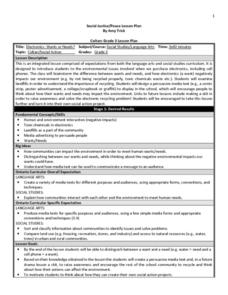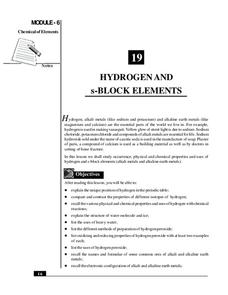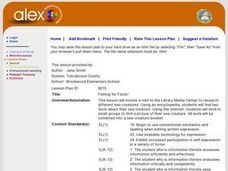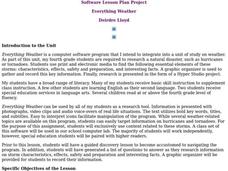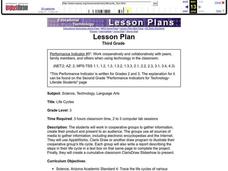PBS
Technology: Conveniences and Consequences
It's a delicate balance—using technology to improve our lives while still protecting the environment, and ourselves, from the hazards of technology use. Class members examine statistics about the increase in media use, complete a survey...
Curated OER
Electronics: Wants or Needs?
Third graders determine how electronics negatively impact the environment. In this environmental lesson, 3rd graders read the article "Earth Friendly Waste Management", and identify how recycling impacts our environment. Students...
National Institute of Open Schooling
Periodic Table and Atomic Properties
An in-depth lesson, the fourth activity in a series of 36, begins with teaching how the periodic table's arrangement came to its current design. Using this knowledge, pupils then move on to analyze the arrangement of elements to their...
National Institute of Open Schooling
General Characteristics of the p-Block Elements
The 20th installment in a series of 36 focuses on the characteristics of the p-block elements. Learners discuss, read about, and answer questions pertaining to the occurrence of these elements in nature, their electron configurations,...
National Institute of Open Schooling
Nomenclature and General Principles
Carbon, the base for all organic compounds, exists in nature in its purest form as graphite or diamonds. The 25th lesson in a series of 36 teaches pupils the nomenclature of organic compounds. Learners read about how to use the IUPAC...
Curated OER
Naming New Species
Students explore science of taxonomy and the Five Kingdoms of life,
categorize organisms into Kingdoms, and create multi-media presentations illustrating knowledge of a Kingdom. They collect data and related pictures on the Internet,...
Curated OER
Bird Up
Third graders identify basic physical and behavioral characteristics of birds and how they adapt to their environments. To organize and share scientific information with peers. They discuss similarities and differences among birds....
National Institute of Open Schooling
Electrochemistry
In an electrolytic cell, electrical energy is converted into chemical energy, the exact opposite of a battery! Lesson 15 in a series of 36 explores electrochemistry. Participants begin by reading and discussing oxidation/reduction...
National Institute of Open Schooling
d-Block and f-Block Elements
Potassium permanganate, containing manganese one of the transition elements, has many uses such as mouthwash and propelling rockets, making it is a very diverse compound. The lesson delves into such transition elements and lanthanides,...
National Institute of Open Schooling
Chemical Bonding
Name is Bond, covalent bond. Through readings and answering questions, classes explore the different types of chemical bonds, their characteristics, valence shell electron pair repulsion theory, and atomic orbitals.
National Institute of Open Schooling
p-Block Elements and Their Compounds – I
Lesson 21 in a series of 36 specifically focuses on elements and their compounds from groups 13, 14, and 15 on the periodic table — including boron, carbon, aluminum, silicon, nitrogen, and phosphorus. Classes learn how some of these...
National Institute of Open Schooling
Hydrogen and s-Block Elements
Lesson 19 in the series of 36 analyzes the element hydrogen and the s-block elements. Through readings, answering questions, and discussion, learners write about and explain their occurrence, physical and chemical properties, and uses.
PBS
Stories of Painkiller Addiction: Prescription Drug Abuse Awareness Campaign
The I-STOP law was designed to regulate the distribution and tracking of prescription drugs. After reading an article about its signing and implementation, middle and high schoolers work together to come up with their own ideas for an...
T. Trimpe
Atomic Basics
Get down to basics with these worksheets on the structure of atoms. Challenging young chemists to identify information from the periodic table and create Bohr diagrams and Lewis dot structures for different elements, this resource would...
Curated OER
Scuba Aruba
Young scholars interview a guest scuba diver or study electronic resources to discover facts about scuba diving. They investigate the physics of scuba diving, the gaseous components of air, equipment used, and safety precautions taken by...
Creative Learning Exchange
The Infection Game: The Shape of Change
Encourage the spread of knowledge in your class with this cross-curricular epidemic simulation. Pulling together science, social studies, and math, this lesson engages students in modeling the spread of infectious diseases, collecting...
NOAA
Oceans of Energy
Are the earth's oceans really just giant batteries, waiting for their energy to be harnessed? Middle school mechanical engineers will be shocked by the amazing amount of energy that forms around them after diving into part four of a...
Curated OER
Ecuadorian Rainforest
Have your class talk about the importance of the rainforest and the products that come from it. Learners watch a video showing the path of chocolate from the rainforest to the supermarket. They discuss how the rainforest and chocolate...
Curated OER
Fishing for Facts!
First graders visit the library or media center to research sea creatures using encyclopedia. They find two facts and research the Internet to find a picture of the sea creature. They create a class sea creature booklet.
Curated OER
A Lesson in Biodiversity: Making Comparisons Between Defensive Mechanisms Utilized by Marine Organisms
If your upper elementary or middle school marine biology learners are going to visit an aquarium, then here is a field trip activity guide for you. It is written specifically for The Maritime Aquarium, but the idea can be adapted to any...
Curated OER
Animals Galore
A well-designed lesson plan which covers the characteristics of the animals found in the six animal groups is here for your young biologists. In it, learners divide up into six groups; the amphibians, reptiles, mammals, birds, fish, and...
Curated OER
Everything Weather
Fourth graders use print and electronic media to find the following essential elements of these storms: characteristics, effects, safety and preparation, and interesting facts. A graphic organizer is used to gather and record this key...
Curated OER
Blazing Gas
Fourth graders read and discuss the sun and the energy we use on Earth from the sun. For this sun lesson plan, 4th graders discuss the solar system, planets, and answer short answer questions.
Curated OER
LIFE CYCLES
Third graders work in cooperative groups to gather information, create their product and present to an audience. The groups use all sources of media to gather information, including electronic encyclopedias and the Internet. They use...



